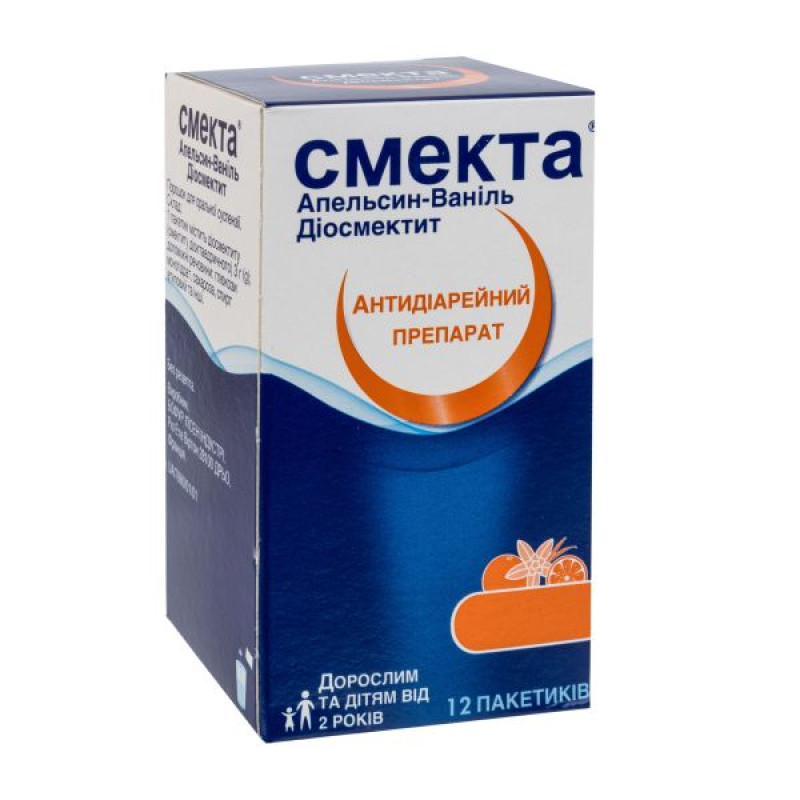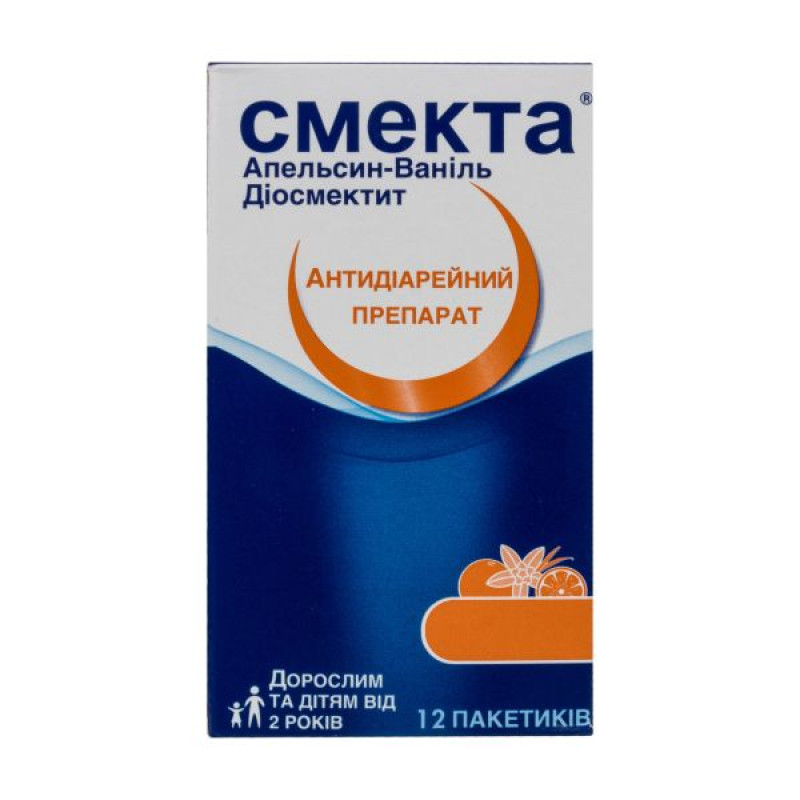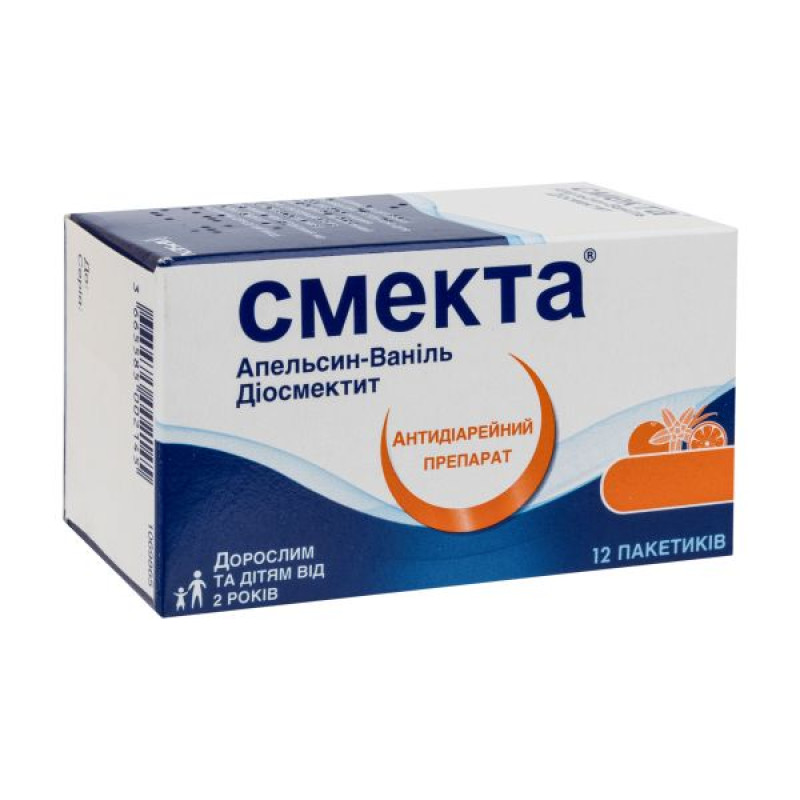Smecta Orange-Vanilla powder for oral suspension 3 g sachet No. 12

Instructions for Smecta Orange-Vanilla powder for oral suspension 3 g sachet No. 12
Composition
active ingredient: diosmectite;
1 sachet contains diosmectite (dioctahedral smectite) 3 g;
excipients: glucose monohydrate, sodium saccharin, vanilla flavor (maltodextrin, sucrose, glycerol triacetate, silicon dioxide, ethyl alcohol, soy lecithin, vanillin, ethyl vanillin, vanilla extract, heliotropin, benzaldehyde, acetylbutyryl, oleic acid, rum ester), orange flavor (maltodextrin, sucrose, gum arabic, mono- and diacetyl tartaric acid ester of mono- and diglycerides of fatty acids, silicon dioxide, concentrated orange oil, orange oil, distilled orange oil, melted oil fraction enriched with aldehyde, concentrated orange oil fraction, orange terpenes, natural ethyl butyrate).
Dosage form
Powder for oral suspension.
Main physicochemical properties: powder from grayish-white to ocher color with a slight orange odor when preparing the suspension.
Pharmacotherapeutic group
Antidiarrheal drugs used in infectious and inflammatory diseases of the intestines. Enterosorbents. ATX code A07B C05.
Pharmacological properties
Pharmacodynamics.
During clinical pharmacology studies, diosmectite demonstrated the ability to:
- adsorb gas in the intestines in adults;
- restore normal mucosal permeability (in a clinical study conducted with the participation of children with gastroenteritis).
Due to its valve structure and high plastic viscosity, diosmectite has a high enveloping ability on the mucous membrane of the digestive tract.
The pooled results of two double-blind randomized studies investigating the efficacy of SMEKTA® Orange-Vanilla compared to placebo in 602 patients aged 1 to 36 months with acute diarrhea showed a significant reduction in stool frequency during the first 72 hours in the group receiving SMEKTA® Orange-Vanilla in combination with oral rehydration.
Pharmacokinetics.
Due to the structure of diosmectite, SMEKTA® Orange-Vanilla is retained on the luminal side of the epithelium, is not adsorbed or metabolized. Diosmectite is excreted in the feces through normal intestinal transit.
Indication
Treatment of acute diarrhea in children aged 2 years and older (in addition to oral rehydration) and in adults.
Symptomatic treatment of chronic functional diarrhea in adults.
Symptomatic treatment of pain associated with functional bowel diseases in adults.
Contraindication
Hypersensitivity to diosmectite or to any of the excipients listed in the "Composition" section.
Interaction with other medicinal products and other types of interactions
The adsorbing properties of this medicinal product may affect the extent and/or rate of absorption of other substances, therefore it is recommended not to use other medicinal products simultaneously with SMEKTA® Orange-Vanilla (if possible, an interval of more than 2 hours should be ensured).
Application features
Diosmectite should be used with caution in patients with a history of severe chronic constipation.
SMECTA® Orange-Vanilla should be avoided in infants and children under 2 years of age. Oral rehydration solution (ORS) is the standard of care for acute diarrhea.
In children aged 2 years and older, acute diarrhea should be treated with early oral rehydration solution (ORS) to prevent dehydration. Chronic use of SMEKTA® Orange-Vanilla should be avoided.
In adults, treatment does not exclude rehydration if necessary.
The volume of rehydration using oral rehydration solution or intravenous rehydration depends on the intensity of diarrhea, the patient's age, and the characteristics of the course of the disease.
The patient should be informed about the need to:
rehydration using a significant volume of salty or sweet liquids to compensate for fluid loss due to diarrhea (the average daily water requirement of an adult is 2 liters);
Maintaining food intake while diarrhea persists:
– excluding certain foods, especially raw vegetables and fruits, green vegetables, spicy dishes, as well as frozen foods or drinks;
– with preference for baked meat and rice.
This medicinal product contains glucose and sucrose. It is not recommended for patients with fructose intolerance, glucose-galactose malabsorption or sucrase-isomaltase insufficiency.
This medicine contains ethanol (alcohol) in small amounts: less than 100 mg per daily dose.
Use during pregnancy or breastfeeding
Pregnancy
Data on the use of the drug SMECTA® Orange-Vanilla in pregnant women are absent or limited (less than 300 pregnancy cases).
Animal studies are insufficient to draw conclusions regarding reproductive toxicity.
It is not recommended to use the drug SMECTA® Orange-Vanilla during pregnancy.
Data on the use of the drug SMECTA® Orange-Vanilla during breastfeeding are limited.
It is not recommended to use the drug SMEKTA® Orange-Vanilla during breastfeeding.
Fertility
The effect of this medicinal product on human fertility has not been studied.
Ability to influence reaction speed when driving vehicles or other mechanisms
No studies have been conducted on the ability to drive and use machines under the influence of this medicinal product. However, its effects are expected to be negligible or absent.
Method of administration and doses
Doses
Treatment of acute diarrhea
Children aged 2 years and over: 4 sachets per day for 3 days, then 2 sachets per day for 4 days.
Adults: 3 sachets per day for 7 days. If necessary, the dose of the drug can be doubled at the beginning of treatment.
Other indications
Adults: an average of 9 g (3 sachets) per day.
Method of application
For oral use.
The contents of the sachet must be mixed to form a suspension immediately before use.
For children, the contents of the sachet can be mixed in a bottle with 50 ml of water for use at intervals throughout the day or mixed well with semi-liquid food such as broth, compote, puree, baby food, etc.
For adults, the contents of the sachet can be mixed with half a glass of water.
Children
Use for the treatment of children aged 2 years and over.
Overdose
Overdose may lead to severe constipation or the formation of a bezoar.
Adverse reactions
The most frequently reported adverse reaction during treatment is constipation, which occurs in approximately 7% of adults and approximately 1% of children. If constipation occurs, treatment with diosmectite should be discontinued and, if necessary, resumed at a lower dose. The table below lists the adverse drug reactions reported during clinical trials and in the post-marketing period.
The frequency of adverse reactions is classified as follows: very common (≥1/10); common (≥1/100, <1/10); uncommon (≥1/1000, <1/100); rare (≥1/10000, <1/1000), very rare (<1/10000), unknown (cannot be estimated from the available data).
Adverse drug reactions identified during clinical trials and in the post-marketing period
| Organ systems | Frequency | Adverse reaction |
| Gastrointestinal tract | Often* | Constipation |
| Infrequently* | Vomiting | |
| Skin and subcutaneous tissue disorders | Infrequently* | Rash |
| Rarely* | Urticaria | |
| Unknown | Angioedema, pruritus | |
| On the part of the immune system | Unknown | Hypersensitivity |
*Frequency determined from clinical trial data.
Reporting of suspected adverse reactions
It is important to report suspected adverse reactions after a medicinal product has been authorised. This allows the benefit-risk balance of the medicinal product to be monitored. Healthcare professionals should report any suspected adverse reactions through the pharmacovigilance system.
Expiration date
3 years.
Storage conditions
No special storage conditions required. Keep out of the reach of children.
Packaging
3.76 g of powder per sachet; 10, 12 or 30 sachets per carton.
Vacation category
Without a prescription.
Producer
BOFUR IPSAIN INDUSTRIES.
Location of the manufacturer and its business address.
Rue Ete Virton 28100 DREAU, France.
There are no reviews for this product.
There are no reviews for this product, be the first to leave your review.
No questions about this product, be the first and ask your question.









